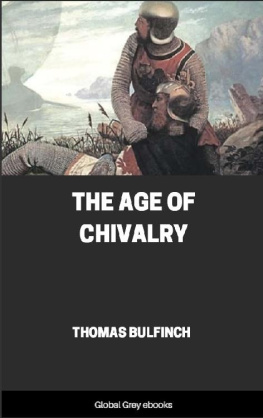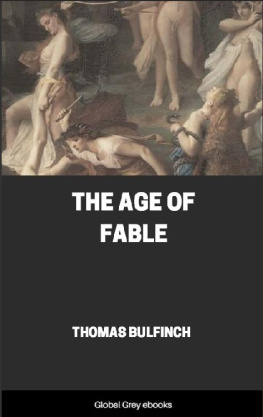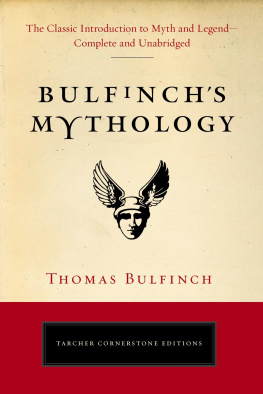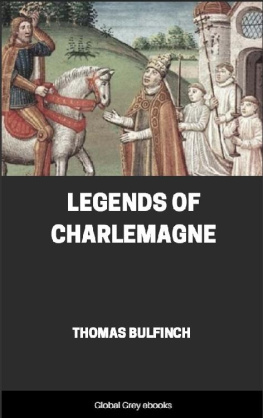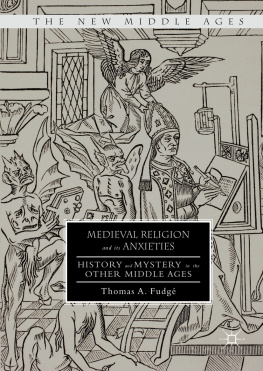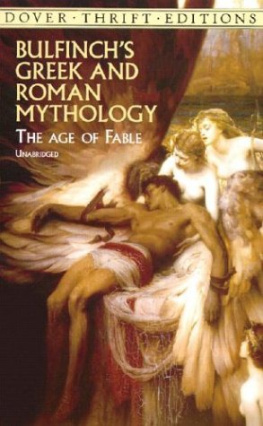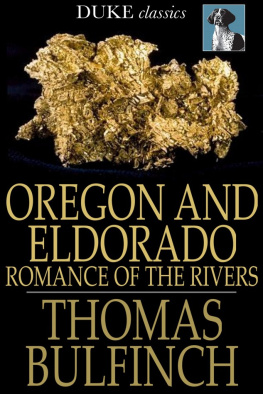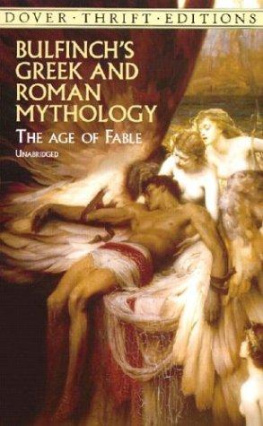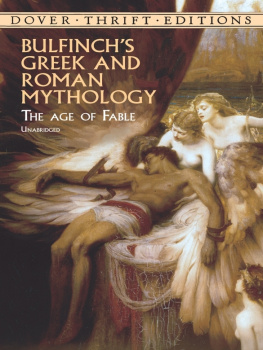Bibliographical Note
This Dover edition, first published in 2004, is an unabridged republication of the work originally published in 1859 by Crosby, Nichols, Boston under the title The Age of Chivalry. The latter comprises one of the three volumes which have come to be known collectively as Bulfinchs Mythology.
Library of Congress Cataloging - in - Publication Data
Bulfinch, Thomas, 1796-1867.
[Age of Chivalry]
Bulfinchs medieval mythology: the age of chivalry / Thomas Bulfinch. p. cm.
Originally published as the age of chivalry. Boston: Crosby, Nichols, 1859.
Includes bibliographical references and index.
Contents: King Arthur and his knightsThe MabinogeonThe knights of English history.
9780486146966
1. Arthurian romances. 2. Mythology, Celtic, in literature. I. Title:
Medieval mythology. II. Bulfinch, Thomas, 1796-1867. Mythology. III. Title.
PN685.B8 2004
398.20940902dc22
2004049309
Manufactured in the United States of America
Dover Publications, Inc., 31 East 2nd Street, Mineola, N.Y. 11501
Throngs of knights and barons bold,
In weeds of peace high triumphs hold,
With store of ladies, whose bright eyes
Rain influence and judge the prize.
MILTON.
THOMAS BULFINCH
(1796-1867)
A NOTE ON THE AUTHOR OF MYTHOLOGY
His course at Harvard College and his years devoted to teaching in his native Boston made Thomas Bulfinch feel the need of something more than a classical dictionary and less than a formal and faithful translation of the enormous literature on the origins of the myths and legends surviving from the remote past. Accordingly, he gave himself the task of crystallizing and popularizing classical literature for the joy and benefit of those who could not seek out original sources. Continuing his work on the golden age of fablethe pagan era of Greek and Roman gods, of Egyptian and Oriental deities and the sagas of the Northwhile employed as an accountant in the Boston Merchants Bank, he re-created the second age of fablethe Middle Agesand then concluded the series with a similar treatment of the Legends of Charlemagne. So completely has his work entered the consciousness of present-day readers that the mere mention of the word mythology evokes the immediate response, by association, of the name Bulfinch.
BIBLIOGRAPHY
Hebrew Lyrical History (1853)
The Age of Fable (1855)
The Age of Chivalry (1858)
The Boy Inventor (1860)
Legends of Charlemagne, or
Romance of the Middle Ages (1863)
Poetry of the Age of Fable (1863)
Oregon and Eldorado, or
Romance of the Rivers (1866)
PREFACE
IN a former work the compiler of this volume endeavored to impart the pleasures of classical learning to the English reader, by presenting the stories of Pagan mythology in a form adapted to modern taste. In the present volume the attempt has been made to treat in the same way the stories of the second age of fable, the age which witnessed the dawn of the several states of Modern Europe.
It is believed that this presentation of a literature which held unrivalled sway over the imaginations of our ancestors, for many centuries, will not be without benefit to the reader, in addition to the amusement it may afford. The tales, though not to be trusted for their facts, are worthy of all credit as pictures of manners; and it is beginning to be held that the manners and modes of thinking of an age are a more important part of its history than the conflicts of its peoples, generally leading to no result. Besides this, the literature of romance is a treasure-house of poetical material, to which modern poets frequently resort. The Italian poets, Dante and Ariosto, the English, Spenser, Scott, and Tennyson, and our own Longfellow and Lowell, are examples of this.
These legends are so connected with each other, so consistently adapted to a group of characters strongly individualized in Arthur, Launcelot, and their compeers, and so lighted up by the fires of imagination and invention, that they seem as well adapted to the poets purpose as the legends of the Greek and Roman mythology. And if every well-educated young person is expected to know the story of the Golden Fleece, why is the quest of the Sangreal less worthy of his acquaintance? Or if an allusion to the shield of Achilles ought not to pass unapprehended, why should one to Excalibar, the famous sword of Arthur:
Of Arthur, who, to upper light restored,
With that terrific sword,
Which yet he brandishes for future war,
Shall lift his countrys fame above the polar star?
It is an additional recommendation of our subject, that it tends to cherish in our minds the idea of the source from which we sprung. We are entitled to our full share in the glories and recollections of the land of our forefathers, down to the time of colonization thence. The associations which spring from this source must be fruitful of good influences; among which not the least valuable is the increased enjoyment which such associations afford to the American traveller when he visits England, and sets his foot upon any of her renowned localities.
The readers of Tennyson are invited to peruse in these legends the originals of those stories which the poet has clothed in the drapery of verse, and given to the public in his Idylls of the King, and in shorter poems. Perhaps some of them may be found more intelligible for our plain narrative of the same events.
THOMAS BULFINCH.
BOSTON, 1858.
PART I
KING ARTHUR AND HIS KNIGHTS
KING ARTHUR AND HIS KNIGHTS
CHAPTER I
INTRODUCTION
ON the decline of the Roman power, about five centuries after Christ, the countries of Northern Europe were left almost destitute of a national government. Numerous chiefs, more or less powerful, held local sway, as far as each could enforce his dominion, and occasionally those chiefs would unite for a common object; but, in ordinary times, they were much more likely to be found in hostility to one another. In such a state of things, the rights of the humbler classes of society were at the mercy of every assailant; and it is plain that, without some check upon the lawless power of the chiefs, society must have relapsed into barbarism. Such checks were found, first, in the rivalry of the chiefs themselves, whose mutual jealousy made them restraints upon one another; secondly, in the influence of the Church, which, by every motive, pure or selfish, was pledged to interpose for the protection of the weak; and lastly, in the generosity and sense of right which, however crushed under the weight of passion and selfishness, dwell naturally in the heart of man. From this last source sprang Chivalry, which framed an ideal of the heroic character, combining invincible strength and valor, justice, modesty, loyalty to superiors, courtesy to equals, compassion to weakness, and devotedness to the Church; an ideal which, if never met with in real life, was acknowledged by all as the highest model for emulation.
The word Chivalry is derived from the French cheval, a horse. The word knight, which originally meant boy or servant, was particularly applied to a young man after he was admitted to the privilege of bearing arms. This privilege was conferred on youths of family and fortune only, for the mass of the people were not furnished with arms. The knight then was a mounted warrior, a man of rank, or in the service and maintenance of some man of rank, generally possessing some independent means of support, but often relying mainly on the gratitude of those whom he served for the supply of his wants, and often, no doubt, resorting to the means which power confers on its possessor.




